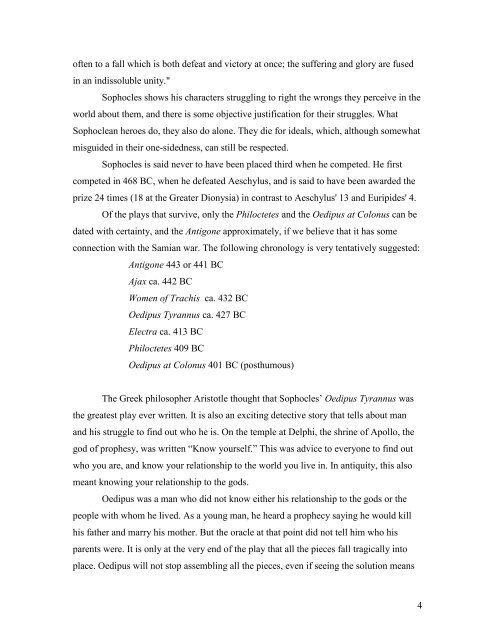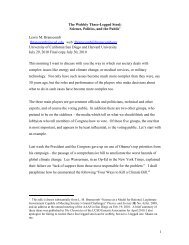1 Sophocles' Oedipus Tyrannus Introduced and Translated by ...
1 Sophocles' Oedipus Tyrannus Introduced and Translated by ...
1 Sophocles' Oedipus Tyrannus Introduced and Translated by ...
You also want an ePaper? Increase the reach of your titles
YUMPU automatically turns print PDFs into web optimized ePapers that Google loves.
often to a fall which is both defeat <strong>and</strong> victory at once; the suffering <strong>and</strong> glory are fused<br />
in an indissoluble unity."<br />
Sophocles shows his characters struggling to right the wrongs they perceive in the<br />
world about them, <strong>and</strong> there is some objective justification for their struggles. What<br />
Sophoclean heroes do, they also do alone. They die for ideals, which, although somewhat<br />
misguided in their one-sidedness, can still be respected.<br />
Sophocles is said never to have been placed third when he competed. He first<br />
competed in 468 BC, when he defeated Aeschylus, <strong>and</strong> is said to have been awarded the<br />
prize 24 times (18 at the Greater Dionysia) in contrast to Aeschylus' 13 <strong>and</strong> Euripides' 4.<br />
Of the plays that survive, only the Philoctetes <strong>and</strong> the <strong>Oedipus</strong> at Colonus can be<br />
dated with certainty, <strong>and</strong> the Antigone approximately, if we believe that it has some<br />
connection with the Samian war. The following chronology is very tentatively suggested:<br />
Antigone 443 or 441 BC<br />
Ajax ca. 442 BC<br />
Women of Trachis ca. 432 BC<br />
<strong>Oedipus</strong> <strong>Tyrannus</strong> ca. 427 BC<br />
Electra ca. 413 BC<br />
Philoctetes 409 BC<br />
<strong>Oedipus</strong> at Colonus 401 BC (posthumous)<br />
The Greek philosopher Aristotle thought that Sophocles’ <strong>Oedipus</strong> <strong>Tyrannus</strong> was<br />
the greatest play ever written. It is also an exciting detective story that tells about man<br />
<strong>and</strong> his struggle to find out who he is. On the temple at Delphi, the shrine of Apollo, the<br />
god of prophesy, was written “Know yourself.” This was advice to everyone to find out<br />
who you are, <strong>and</strong> know your relationship to the world you live in. In antiquity, this also<br />
meant knowing your relationship to the gods.<br />
<strong>Oedipus</strong> was a man who did not know either his relationship to the gods or the<br />
people with whom he lived. As a young man, he heard a prophecy saying he would kill<br />
his father <strong>and</strong> marry his mother. But the oracle at that point did not tell him who his<br />
parents were. It is only at the very end of the play that all the pieces fall tragically into<br />
place. <strong>Oedipus</strong> will not stop assembling all the pieces, even if seeing the solution means<br />
4









